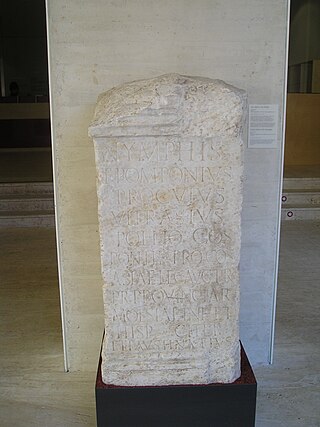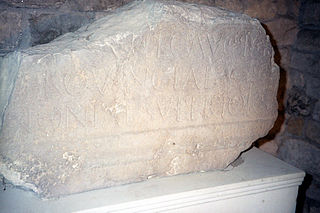Related Research Articles
Gaius Julius Severus was a Roman senator and aristocrat of the second century. He was suffect consul around the year 138.

Titus Pomponius Proculus Vitrasius Pollio was a Roman senator, who held several imperial appointments during the reign of Marcus Aurelius. He was suffect consul in an undetermined nundinium around 151; he was a consul ordinarius in the year 176 with Marcus Flavius Aper as his colleague.
Publius Martius Verus was a Roman senator and general. He was twice consul. Verus played a major role in the suppression of the revolt of Avidius Cassius by remaining loyal to the emperor Marcus Aurelius.
Titus Prifernius Paetus Rosianus Geminus was a Roman senator of the second century who held a series of posts in the emperor's service. He was suffect consul for the nundinium of May-June AD 146 as the colleague of Publius Mummius Sisenna Rutilianus.
Titus Flavius Longinus Quintus Marcius Turbo was a Roman senator who held a series of offices in the emperor's service. He was suffect consul for one of the nundinia in the years 149 through 151. Longinus is known primarily from inscriptions.

Marcus Iallius or Jallius Bassus was a Roman senator, general, and literary figure who held several offices in the imperial service during the mid-second century AD. He was suffect consul around the year 159. Bassus is known primarily from inscriptions. His full name was Marcus Iallius Bassus Fabius Valerianus.
Gaius Javolenus Calvinus was a Roman senator of the 2nd century AD who occupied a number of offices in the imperial service, as well as serving as suffect consul between 140 and 143.
Lucius Antonius Albus was a Roman senator of the 2nd century AD who occupied a number of offices in the imperial service, as well as serving as suffect consul circa 132. Albus is best known for his tenure as proconsular governor of Asia, when, according to Aelius Aristides, a series of earthquakes struck western Asia Minor.
Lucius Pullaienus Gargilius Antiquus was a Roman senator, who held a number of offices in the imperial service during the reign of Antoninus Pius. He is known to have been a suffect consul in the early years of the reign of Marcus Aurelius, most likely in the year 162. He is known entirely from inscriptions.
Marcus Annius Libo was a Roman senator. He was suffect consul in the nundinium of January-April 161 with Quintus Camurius Numisius Junior as his colleague. Libo was the nephew of emperor Antoninus Pius, and cousin to emperor Marcus Aurelius.
Lucius Sergius Paullus was a Roman senator, who was active during the reign of Marcus Aurelius. He was twice consul: the first time attested 23 September of an unknown year as suffect consul with [? Lucius Nonius Calpurnius] Torquatus Asprenas as his colleague; and as consul ordinarius for 168 as the colleague of Lucius Venuleius Apronianus Octavius Priscus.

Titus Caesernius Statianus was a Roman senator who held a number of appointments in the Imperial service during the reigns of Hadrian and Antoninus Pius. He was suffect consul in the nundinium of September-October 141; his colleague's name is not known. His full name is Titus Caesernius Statius Quinctius Statianus Memmius Macrinus.
Titus Caesernius Quinctianus was a Roman senator who held a number of appointments in the Imperial service during the reigns of Hadrian and Antoninus Pius. He was suffect consul in an undetermined nundinium around the year 138. His full name was Titus Caesernius Statius Quinctius Macedo Quinctianus.
Titus Flavius Boethus was a Roman senator, who was active during the reign of Marcus Aurelius. He is known as being an acquaintance of the physician Galen. Boethus was suffect consul in one of the nundinia falling in the later half of 161 with [? Julius] Geminus Capellianus as his colleague.
Gaius Julius Bassus was a Roman senator, who was active during the reign of Antoninus Pius. He was suffect consul in the nundinium of November-December 139 as the colleague of Marcus Ceccius Justinus. He was the son of Gaius Julius Quadratus Bassus, consul in 105. The Julii Bassi were a prominent family of Pergamum, that had descended from the Attalid dynasty and Galatian tetrarchs.
Quintus Caecilius Marcellus Dentilianus was a Roman senator, who held several imperial appointments during the reign of Antoninus Pius. He was suffect consul in an undetermined nundinium around AD 150. He is known entirely from inscriptions.
Publius Cluvius Maximus Paullinus was a Roman senator, who held a number of imperial appointments during the reigns of Hadrian and Antoninus Pius. He was suffect consul during an undetermined nundinium between 139 and 143. He is known entirely from inscriptions.
Julianus is the cognomen of a Roman senator whose tenure as suffect consul with one Castus as his colleague, is known from a number of brick stamps. A number of experts have surmised he is to be identified with a proconsul of Asia mentioned in the writings of the sophist Aelius Aristides.
Marcus Servilius Fabianus Maximus was a Roman senator, who was active during the reigns of Antoninus Pius and Marcus Aurelius. He was suffect consul in a nundinium in mid-158 with Quintus Jallius Bassus as his colleague.
Marcus Cominius Secundus was a Roman senator, who was active during the reign of Marcus Aurelius. He was suffect consul in one of the later nundinia of 151 with Lucius Attidius Cornelianus as his colleague. He is known from inscriptions and military diplomas issued during his time.
References
- ↑ Géza Alföldy, Konsulat und Senatorenstand unter der Antoninen (Bonn: Rudolf Habelt Verlag, 1977), pp. 159, 214
- ↑ CIL XII, 3168
- ↑ Werner Eck, "Jahres- und Provinzialfasten der senatorischen Statthalter von 69/70 bis 138/139", Chiron , 13 (1983), p. 198
- ↑ Alföldy, Konsulat und Senatorenstand, p. 214
- ↑ Bowersock, Greek Sophists in the Roman Empire (Oxford: Clarendon Press, 1969), p. 37
- ↑ Bowersock, Greek Sophists, p. 38
- ↑ Alföldy, Konsulat und Senatorenstand, p. 324